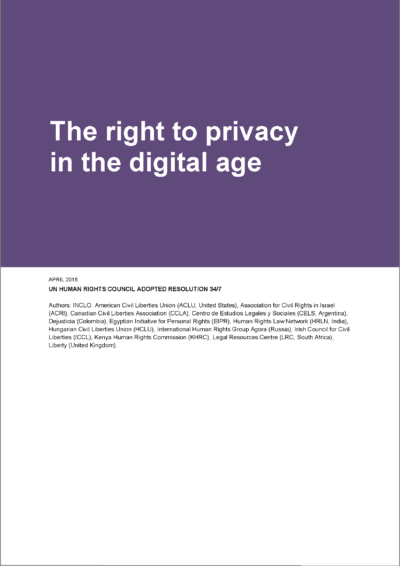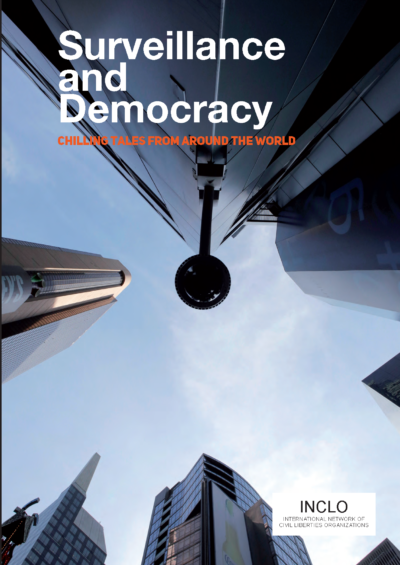
The Court of Appeals of the City of Buenos Aires confirmed the unconstitutionality of the use of the Fugitive Facial Recognition System (SRFP) implemented by the Buenos Aires City Government
The ruling confirms what CELS and the Observatorio de Derecho Informático Argentino (ODIA) have denounced: the system was operated outside the law that regulates it and without oversight mechanisms.
Federal Justice Dismissed Kevin Guerra for his Statements on Twitter
National Gendarmerie had pressed charges against the 20 year old in April 2020 as a result of activities of mass surveillance on social media officially referred to as “cyber patrols”. He was dismissed in late 2020.
Using the G20 as an excuse to justify state violence
On the pretext of the upcoming G20 meeting in Buenos Aires, the government is promoting the notion of “internal enemies” and trying to justify greater levels of persecution of political dissidence and repression and criminalization of protest.
INCLO welcomes historic win against UK mass surveillance
In a landmark win for seven members of the International Network of Civil Liberties Organizations (INCLO), the European Court of Human Rights ruled that the UK’s mass surveillance practices violate privacy and freedom of expression. CELS joins all its fellow INCLO members in celebrating this victory.
The right to privacy in the digital age
Autor/a: INCLO
11 pgs.
ver más
Privacy at risk: Telegram sanctioned in Russia for protecting its users
The Russian government fined Telegram and could block use of the instant messaging app, because the company refused to grant it access to users’ communications. Members of INCLO, including CELS, seek to curb such measures.
Protest, social movements and state crackdowns
A fresh round of content published on our Right to Protest platform covers ground across the world: from Kenya, Hungary and Australia to Peru, Canada and Argentina. The threats to this fundamental right can be seen on the street, with violent repressions, and in terms of state surveillance and judicial persecution. This online project was developed by openDemocracy, CELS and INCLO, with support from the ACLU.
WTO meeting in Argentina: Rejected accreditations and deportations
The government rejected the accreditations of 65 people who planned to participate in the WTO Ministerial Conference in Buenos Aires and sent the list to immigration officials as a security “alert.” Two people on the list were ultimately deported.
WTO in Buenos Aires: Petitions for habeas corpus, habeas data and access to information
What information was gathered to decide which activists and organizations should be kept from participating in the WTO Ministerial Conference, and how was it collected? We present a set of habeas data petitions and a request for access to information.
Government must scrap decision to exclude civil society from the WTO Ministerial Conference
The Argentine government has revoked the accreditation of key civil society actors before the World Trade Organization. It attempted to justify this action by admitting it was based on an analysis of organizations’ social networks that aimed to exclude those considered “disruptive.” CELS and other organizations jointly submitted a letter requesting that this decision be rescinded.
“Privacy is an entry point to all civil liberties and human rights”
Digital security expert Ramy Raoof says state surveillance has harmful consequences even when it is not used to persecute people. Ramy has worked extensively in the Middle East and North Africa, and came to Argentina on the initiative of the International Network of Civil Liberties Organizations (INCLO).
Mexican government spies on critical voices
In the midst of a wave of unpunished violence against journalists and human rights defenders, it has come to light that the Mexican government is running surveillance and spying on members of the press, activists and political parties. Human rights organizations are calling for an investigation of these acts by a panel of independent experts.
What intelligence is being shared among countries?
The International Intelligence-Sharing Project was launched to demand that governments in eight countries tell the public what information-sharing agreements are in place with other nations. In Argentina, we filed an information request to the Federal Intelligence Agency (AFI).
Surveillance and the use of “less lethal” weapons during protests
Michael Power of South Africa’s Legal Resources Centre, Homer Venters from Physicians for Human Rights, and Matthew Cagle from the American Civil Liberties Union share reflections on state responses to social protest.
Surveillance and Democracy: Chilling Tales from Around the World
Autor/a: Various
122 pgs.
ver más
Snowden: “In all countries where we see a strong and secret intelligence agency, we see abuses”
Edward Snowden spoke about the lack of oversight of intelligence systems and the scope of this problem.




